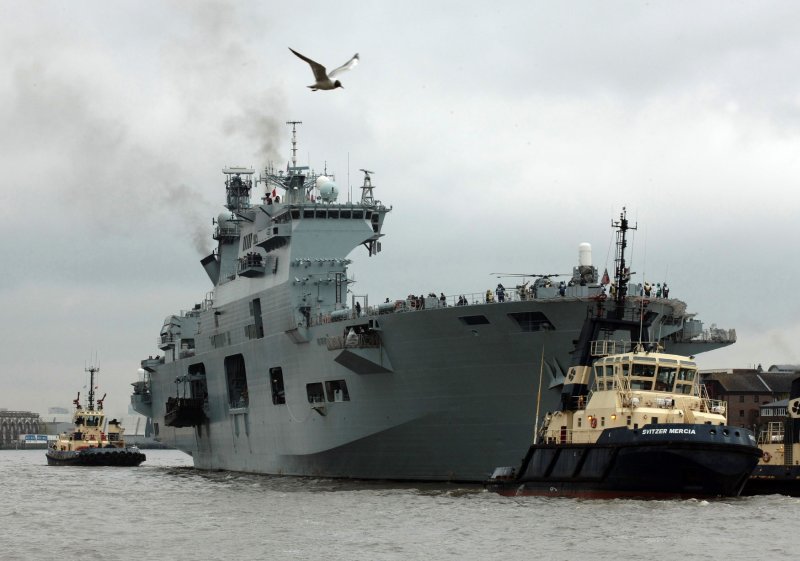Royal Navy Helicopter Carrier HMS Ocean heads towards the Canary Wharf business district in London on its way to Greenwich as part of ongoing security peparations ahead of the London Olympics in July on May 4, 2012. The British Armed forces are staging various security tests around London for every eventuality. UPI/Hugo Philpott |
License Photo
LONDON, July 17 (UPI) -- British military and civilian authorities have imposed airspace restrictions over London and southeastern England ahead of the 2012 Summer Olympics.
The Ministry of Defense said Saturday the restrictions were put into force to "ensure a safe and secure London 2012 Olympic Games."
"Equipment and personnel from the Royal Navy, Army and Royal Air Force are in place to enforce the restrictions and provide enhanced protection for the period the temporary restrictions are in force," the ministry said in a release.
As part of the enhanced security efforts for the July 27-Aug. 12 Games, Britain has deployed Typhoon jets to the British air force base in Northolt, England, as well as readying Puma helicopters staffed with air force sniper teams to intercept unauthorized aircraft.
The helicopters were deployed last week to the Ilford Territorial Army Center.
Also as part of the preparations, army Rapier and Starstreak ground-based air defense systems have been installed at six sites in London while navy Sea King helicopters were sent to Northolt.
In addition, the British navy's largest ship -- the helicopter carrier HMS Ocean -- returned to London to serve as a base for helicopter operations for the Olympics.
Phil Roberts, assistant director of airspace policy at Britain's Civil Aviation Authority, said the agency has worked with the military and civilian air traffic controllers to get word of the restrictions out to pilots.
"The government's airspace security restrictions will primarily affect private pilots so, together with pilot associations and other bodies, we've been undertaking a significant program to alert pilots to how they need to comply and keep flying during the Games," he said.
The consequences of violating the airspace restricts restrictions could be lethal, warned Air Vice Marshal Stuart Atha, commander of Olympics Air Security.
He told the BBC Friday a plane could be shot down in a "worst-case scenario," adding "the highest level of government" would make the call on such a decision.
"We are planning on a terrorist threat environment that is severe ... we are not suggesting that there is any particular threat or risk to the Games that we know about," a British Home Office spokesman said.
The BBC reported the pilots of light aircraft would be allowed to fly over London under the restrictions but only if they had gone through a series of security procedures.
The airspace security moves came in addition to the 17,000 troops already assigned to the games. The game's organizers said last week they were looking into the possibility of more troops to help provide security.
The Daily Telegraph reported another 3,500 service members were dispatched to London last week after a private security contractor came up short in manpower requirements. Company officials admitted they ran into trouble finding enough qualified applicants.
Although the contractor, GS4, will remain on the job despite the short staff, the British military has contingency plans in place to send more people to the Olympics, the newspaper said.





